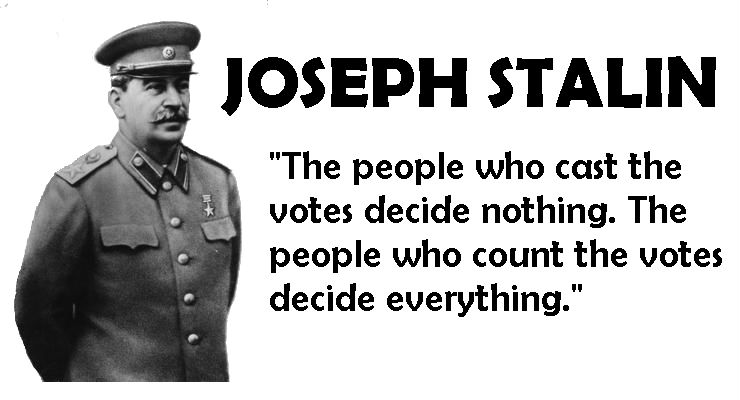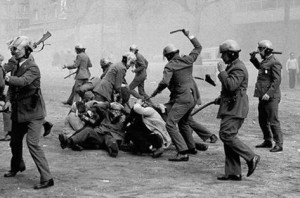
A all-encompassing definition of dictatorship is something easier said than done, author finds
Democracy, elections and voting at Democracy Chronicles
Edukalife presents: Definition, Concept and Meaning of Dictatorship
- Concept of dictatorship
- Meaning of dictatorship
- Definition of dictatorship
1. Concept of dictatorship
Dictatorship means that system of Government which rests on a single person and that is of high authoritarianism. The figure who embodies this dictatorship is obviously the dictator and this always represents the maximum hierarchy and authority for all things related to the development of a society.
In general, the dictatorial Government is characterized for being autocratic. The autocratic term comes from the Greek and means that the Government is organized and managed by a single person and authoritarian way. In the majority of cases, dictatorships tend to be illegitimate Governments systems as they do with the power through violent inroads in public and political space from one country or region. However, it is also possible that a Government of democratic or participatory type end up evolving toward dictatorial forms according to the interests of the person in charge.
A dictatorship is characterized in general terms to be established on the basis of force and violence, both elements which serve to subdue the opposing positions. While they repress and eliminate all those voices that may be contrary in the interests of the dictator, are also abandoned the popular and social participation mechanisms that can represent other interests (elections, suffrage, the work of other political powers, etc.).

In many cases, dictatorial governments can do with the power since they are supporting in different situations of economic crisis, political turmoil and social chaos. The concentration of political power in a single person of particular importance since it is, for the dictators, the only means through which would be some peace and order.
Dictators and dictatorial regimes have been many throughout human history. Here it is important to note that not all Governments that not involved citizenship are already dictatorial (as happened with the European monarchies), they found legitimacy in other areas which are not the electoral act. Among the most important dictatorial governments of history, Nazi Germany, Italian fascism and dictatorship prior to the Roman Empire, Latin American or African dictatorships from the second half of the 20th century are undoubtedly the most representative of such a condition.
2 Meaning of dictatorship
A dictatorship (from latin dictatūra) is a form of Government in which power is concentrated in the hands of a single individual, which is known as a dictator. Currently, dictatorships are established through a coup, armed or military, so that, once in power, the decisions of the dictator should be maintained thanks to the existence of an
armed force.
Dictatorships are characterised by not having a separation of powers, in addition to govern without consent or opinion of the citizens. The vast majority of them nor allow the existence of opposition political parties, so there is only a single party without competition and with the control of the political life of a nation.
One can distinguish two types of major dictatorships: the authoritarian and the totalitarian. Although similar, both possess characteristics that distinguish them, allowing that they lend to confusion. The authoritative, for example, are distinguished by having a high concentration of power in a small group of people, which are maintained by the open political repression. These Governments often enact laws arbitrarily, and although strict, often allow a light social mobilization and some kind of plurality of ideas, provided that does not put at risk the permanence of the regime.
Moreover, totalitarian dictatorships tend to be more extreme in every sense. They not only do not support any kind of opposition, but that they insist on open control each and every aspect of the lives of the citizens. In totalitarian dictatorships, civil liberties are reduced to a minimum and the Government not only intervenes, but directly handles the economy, education, propaganda, media, family and moral values.
3. Definition of dictatorship
Dictatorship is called form of governance exercised by a single person who uses its power arbitrarily and without being especially limited by law. Thus, a dictator takes decisions setting aside chances of consensus with the ruled people, aspect that is the polar opposite of a democratic authority, which is elected by their constituencies.
It is worth noting that, according to the philosophical precepts of ancient Greece, the dictatorship does not seem comparable to the original opposed proposed between pure and impure forms of Government. In this model, supported by the Athenian philosophers, one-person forms of Government were the monarchy (monkeys: one, archos: Government), as ideal or pure form, and tyranny, as corrupted variant of this Government modality. On the other hand, the dictatorship as a concept and structure of political action was born in later stages of civilization.
Indeed, the origins of the term dictatorship must be traced back in the time that Roman civilization thrived.
Basically, the dictatorship there had a legal status as a way of Government exercised extraordinary way to difficult moments that require rapid decisions. In this context, it is said that the proposal was carried out for the first time by Tito Laércio, who would have been the first to make use of this position.
The Senate was authorized to determine if this change was needed; If the circumstances merited it, gave an order to one of the consuls, which proceeded to appoint the dictator; After that time, no one could make criticism of the management of the new Government. However, at its inception, had reasonable limits to these special powers. Thus, the “dictator” only had power for a period of six months, after which his powers were revoked. At that time, he should realize their actions.
As it was to be expected, this practice could lead to attempt to occur in power indefinitely through stratagems that would place the birth of monarchies; Therefore, it would be subsequently abolished.
The dictatorial model of power was then various abuses that, far from stopping, intensified on the occasion of the custom of the acts of Government exercise. While in Medieval Europe, this form of Government was mitigated as a result of the feudal structures of power distribution, the birth of modern States in the 15th and 16th centuries gave rise to a new approach of the monarchies. Some of these Nations evolved with equivalent governmental structures to dictatorships, even models that emerged after the French Revolution and the independence of the American Nations allowed a Republican modalities worldwide broadcast.
However, the dictatorships ruled the lives of many people in the 20th century, as it did with the one-man concentration of power in Germany during the Government of Adolf Hitler, in Italy with Il Duce Benito Mussolini or Josep Stalin in the Soviet Union.
Currently, the most recent dictatorships must be in underdeveloped countries. Many of them were extended and strengthened during the time of the cold war. In that historical moment, United States and the Soviet Union maintained a veiled dispute that led each of them to support dictatorial governments which maintained its authority on the basis of fear and bypassing any possibility of consensus. Stronger examples include various dynasties Regents in North Africa and the Middle East (Libya, Tunisia, Syria and Iraq, among others), the ruling regime in Cuba since 1959, the military dictatorships in Latin America during the 1970 and 1980, the Governments of the so-called “iron curtain” in Europe’s East and Central Asia and various government schemes of semi-colonial Africa. A majority proportion of these dictatorships have ceased to exist, giving way either to Governments of transition or Republican governance structures, with different regional variations that characterize every village and every culture.
Today, most of the world’s societies has warned the deleterious effects of dictatorships on their individual rights, by which democracies are the form of Government preferred by these Nations. The dictatorial methods are recognized as a risk for freedom and the growth of States and are repudiated by the international community explicitly.
See more at edukalife.
Also see our World Democracy News page with more information on the global movement.
Leave a Reply